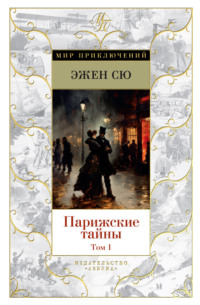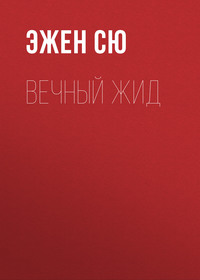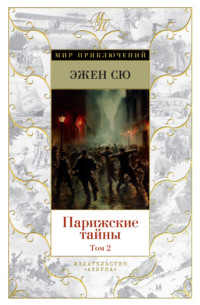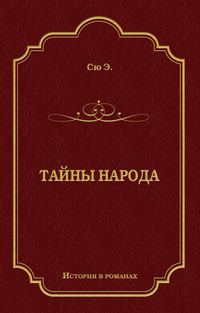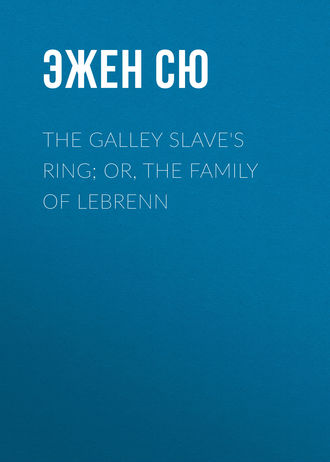
The Galley Slave's Ring; or, The Family of Lebrenn
"You are right, father," agreed Sacrovir; "that custom explains what at first seemed extraordinary to us."
"In a minute I shall give you, my children," the merchant proceeded to explain, "some further information regarding the language used in these manuscripts. I must first bespeak your attention for these pious relics, which will make clear to you many things that you will run across in the manuscripts. This gold sickle," added the merchant, replacing the jewel upon the table, "is, as you see, the symbol of manuscript Number 1, dated the year 57 before Jesus Christ. You will learn that that epoch was to our family, free at the time, an epoch of happy prosperity, of virile virtues, of proud principles. It was, alas! the close of a beautiful day. Frightful disasters came upon its heels – slavery, torture and death." After a moment's silence during which the merchant remained steeped in thought, he resumed: "Each of these manuscripts will inform you, century by century, concerning the life of our ancestors."
For several minutes the eyes of the children of Marik Lebrenn wandered over the mementoes of the past lying on the table. Their eyes rested occasionally with greedy curiosity upon one object or another. They contemplated them in silence, and no less moved than their father.
Attached to the little gold sickle was, as Marik Lebrenn had stated, a manuscript bearing the date of the year 57 before Jesus Christ.
To manuscript Number 2, dated the year 56 before Jesus Christ, was attached a little brass bell, very much like the bells which to this day are attached to the necks of cattle in Brittany. The bell, accordingly, was at least nineteen hundred years old.
To manuscript Number 3, bearing the date of the year 28 before Jesus Christ, was attached a fragment of an iron collar, or carcan, corroded with rust, and on which the outlines of certain Roman letters could be deciphered, cut into the iron:
SERVUS SUM – (I am the slave)As a matter of course the name of the slave's owner was on the missing fragment. The carcan must have been at least eighteen hundred and seventy-seven years old.
To manuscript Number 4, which was dated the year 32 of our era, was attached a little silver cross from which hung a tiny little chain of the same metal. Both seemed to have been blackened by fire. The little cross was eighteen hundred and seventeen years old.
To manuscript Number 5, dated the year 296 of our era, was attached a massive copper ornament that once formed part of the top of a casque and represented a lark with wings partly distended. This fragment of a casque was fifteen hundred and fifty-three years old.
To manuscript Number 6, dated the year 550 of our era, was attached the hilt of an iron dagger, black with the mould of ages. On one of its sides could be seen the word:
GHILDEon the other the following two words in the Celtic and Gallic tongues respectively – very much resembling the Breton of our own days:
AMINTIAICH (Friendship)COMMUNITEZ (Community)The poniard's hilt was every bit of thirteen hundred years old.
To manuscript Number 7, dated the year 615 of our era, a rusty branding needle was attached. This article was fully twelve hundred and thirty-four years old.
To manuscript Number 8, dated the year 737 of our era, an abbatial crosier was attached. It was of chiseled silver and bore evidence of once having been gilded over. The name Meroflede could be deciphered amid the exquisitely wrought ornamentation of the relic. The crosier was eleven hundred and twelve years old.
To manuscript Number 9, dated the year 811, two pieces of Carlovingian money were attached. Their reverse bore the effigy of Charlemagne, still recognizable. One of the coins was of copper, the other of silver. They were held together by an iron wire. The two coins were ten hundred and thirty-eight years old.
To manuscript Number 10, dated the year 912, was attached a barbed iron arrow head. The arrow-head was nine hundred and thirty-seven years old.
To manuscript Number 11, dated the year 999, was attached a fragment of an infant's skull. The child, judging by the size and structure of the fragment, must have been between eight and ten years of age. The external wall of the fragment bore, graven in the Gallic tongue, the words:
FIN-AL-BRED (The End of the World)The skull was eight hundred and fifty years old.
To manuscript Number 12, dated the year 1096, was attached a ribbed white shell, of the sort that is seen on the pictures of pilgrims' mantles. The frail shell was seven hundred and fifty-three years old.
To manuscript Number 13, dated the year: 1208, was attached a pair of iron pincers, an instrument of torture, the tongues of which were serrated so that the teeth fitted exactly into one another. This instrument of torture was six hundred and forty-one years old.
To manuscript Number 14, dated the year 1358, was attached a little iron trevet of about twenty centimeters in diameter, that looked as if it, had been almost fretted out of shape by fire. The trevet was four hundred and ninety-nine years old.
To manuscript Number 15, bearing the date of the year 1413, was attached an executioner's knife with a horn handle, the blade of which was eaten up with rust and partly broken. The knife was four hundred and thirty-six years old.
To manuscript Number 16, bearing the date of the year 1535, was attached a little pocket Bible, belonging to the first years of the printing press. The cover of the book was almost wholly burnt up, likewise the corners of the pages, as if the Bible had been exposed to fire. Several pages also bore stains that must have been of blood. The Bible was three hundred and fourteen years old.
To manuscript Number 17, dated the year 1673, was attached the iron head of a heavy blacksmith's hammer, on which, engraved in the Breton tongue, could be read the words:
EZ-LIBR (To be free)The hammer was one hundred and seventy-six years old.
To manuscript Number 18, dated the year 1794, was attached a sword of honor, with hilt of gilded copper bearing, the following inscription engraved on the blade:
JOHN LEBRENN HAS DESERVED WELL OF THE FATHERLANDFinally, unaccompanied by any manuscript, and only bearing the dates of 1848 and 1849, came the last two articles that made up the collection:
The dragoon's casque which was presented in February of 1848 to Marik Lebrenn by the Count of Plouernel, and the iron ring that the merchant had worn in the galleys of Rochefort that very year of 1849.
It can easily be imagined with what pious respect and burning curiosity these fragments of the past were examined by the merchant's family. He interrupted the pensive silence that his children preserved during the examination, and resumed:
"Accordingly, as you see, my children, these manuscripts relate the history of our plebeian family for the last two thousand years. Accordingly, also, this history could be called the history of the people, of their faults, their excesses, occasionally even of their crimes Slavery, ignorance and misery often deprave man in degrading him. But thanks be to God, in our family, the bad acts are rare, while, on the other hand, numerous have been the patriotic and heroic deeds of our Gallic forefathers and mothers during their long struggle against the Roman and then the Frankish conquest. Yes, the men and the women – for, often will you see in the pages of these narratives that the women, like worthy daughters of Gaul, vie with the men in abnegation and intrepidity. Many a one of these touching and heroic figures will remain cherished and glorified in your memory as the saints of our domestic legend. Now, one word concerning the language used in these manuscripts. As you know, my children, your mother and I have ever kept at your side, since your earliest years, a female servant from our own country, in order that you might learn to speak the Breton dialect at the same time that you learned to speak French; furthermore, your mother and I ever kept you familiar with that dialect by using it frequently in conversation with you."
"Yes, father."
"Well, my son," said Marik Lebrenn to Sacrovir, "in teaching you the Breton tongue I had above all in mind – obedient, moreover, to a tradition in our family, according to which it never forgot its mother tongue – to enable you to read these manuscripts."
"Are they, then, written in the Breton tongue, father?" asked Velleda.
"Yes, my children. The Breton tongue is none other than the Celtic or Gallic that was once spoken all over Gaul before the Roman and Frankish conquests. With the exception of a few changes that have taken place in the course of the centuries, it has preserved its purity in our Brittany, down to our own days. Of all the provinces of Gaul, Brittany was the last to submit to the Frankish Kings who issued from the conquest. Yes, let us never forget the proud and heroic motto of our fathers, conquered and despoiled though they were by the invader: We still preserve our name, our tongue, our faith. Now, then, my children, after two thousand years of struggles and strifes, our family has preserved its name, its tongue and its faith. We call ourselves Lebrenn, we speak Gallic, and I have raised you in the faith of our fathers, in the faith of the immortality of the soul and of the continuity of existence which enables us to look upon death as a change of habitation, nothing more – a sublime faith the morality of which, taught by the druids, was summed up in precepts like these: Adore God; do no harm; exercise charity; he is pure and holy who performs celestial works and pure. Fortunately, my children, we are not the only ones who preserved the sublime dogma of the continuity of life. Armand Barbès, one of the bravest militants of the democracy, when taken prisoner and subsequently condemned to death under the reign of Louis Philippe, awaited the hour of his execution with religious serenity of soul. The serenity which he preserved he drew from his faith in the perpetuity of life, a fundamental principle in our creed. I can do no better, my friends, than to read to you a page from the writings of Armand Barbès, the page which he dedicated to the memory of Godefroid Cavaignac, the publicist of the democracy, entitled: 'Two days of a death sentence.'"
Lebrenn read:
"It was the 12th of June, 1839. After four days' deliberation the Court of Peers notified me of its sentence. According to the usage in such cases, it was the registrar who brought me the sentence, and the honorable Cauchy thought it his duty to add to his message a little puff for the Roman Catholic and Apostolic religion. I answered him that I had my own religion and believed in God, but that that was no reason why I should be in need of the consolations of a priest, whosoever he might be. I requested him to be kind enough to inform his masters that I was ready to die, and that I only hoped that when their last hour approached their soul might be as tranquil as mine.
"Armand Barbès then proceeds to tell how, instinctively inspired, and led by the approach of his last hour to a plane of lofty thought, he recalled with thrilling gratitude the source from which he drew his supreme tranquility in the face of death. He then says further:
"One day I read in the New Encyclopedia the superb article on Heaven by John Raynaud. Passing by the irrefutable arguments with which he incidentally demolishes the heaven and hell of the Catholics, his leading thought, as taught by the druid faith, of deriving from the law of progress the infinite series of our lives, as they continuously progress in worlds that gravitate ever nearer and nearer to God, seemed to me to satisfy at once all our multiple aspirations. Do not the moral sense, the imagination, do not our desires, does not everything find there its place? Nevertheless, carried away, while I read the article, by the pre-occupations of an active republican, I gave at the time little thought to details; all I did with these was to deposit them, so to speak, undigested in my heart. But later, when picked up wounded on the street I inhabited a prison cell with the scaffold in perspective, I drew them out of the place where I held them in reserve as a last store of wealth the value of which the time had come for me to appreciate in full – and these thoughts rose naturally to my mind during my watches, already a victim bound for the executioner, during these solitary hours when I kept watch in the solemn night of death.
"I beg pardon of John Raynaud, the elegant encyclopedist, for my having turned into a vile plummet, in order to meet the exigency of the moment, the pure gold of his philosophy. Thus, after confirming with some preliminary reasoning my belief in the immortality of the soul, meseems a sublime Jacob's ladder unrolled before my eyes, with its foot resting on the earth to climb heavenward, eternally, from star to star, from sphere to sphere! The cart, this planet upon which I had spent thirty years, looked to me to be one of the innumerable specks where man makes his first landing in life – whence he begins to climb upwards before God, and, when the phenomenon which we call death is accomplished, man, drawn by the attraction of progress, is forthwith re-born in a superior star with a new expansion of his being.
"So you see, my children, what fortitude of soul the dogma of the perpetuity of life is able to impart. Let us, then, follow the example of our forefathers; let us follow in the footsteps of their belief; and let us, like them, preserve our name, our tongue and our faith."
"We shall not fail in that pledge, father," answered Velleda.
"We shall show neither less courage nor less persistence than our ancestors," added Sacrovir. "Oh, how I shall be thrilled with ecstasy when I read those venerated lines which they have traced! But is the chirography of the Celtic or Gallic language the same exactly as the Breton, which we are accustomed to read, father?"
"No, my boy. Since a number of centuries back, the Gallic chirography, which originally was the same as the Greek, began to be little by little modified in the course of time, and finally fell into disuse. But my grandfather, a working compositor, learned and well lettered, transcribed into modern Breton all the manuscripts that were in Gallic. Thanks to his work, you will be able to read those manuscripts as fluently as you read the legends that our good Gildas loves so well, and which, composed eight or nine hundred years ago, are still current in our villages of Brittany, printed on brown paper."
"Father!" exclaimed Sacrovir. "One more question. Did our family always inhabit our beloved Brittany during all these centuries?"
"No – not always, as you will see in these narratives. The conquest, the wars, the rude vicissitudes to which a family like ours was exposed in those evil days, often compelled our forefathers to leave their natal soil, – sometimes because they were carried away slaves or prisoners into other provinces; sometimes in order to escape death; other times, again, in order to gain their bread; still other times in obedience to foreign laws; and, finally, occasionally driven thereto by the whims of fate. Nevertheless, few are our forefathers who did not make a certain pious pilgrimage, as I have made myself, and as you, in turn will make on the first of January following the year of your majority, that is next January 1."
"And why on that particular day, father?"
"Because the first day of each new year has ever been a solemn day with the Gauls."
"And in what does the pilgrimage consist?"
"You will proceed to the druid stones of Karnak, near Auray."
"Indeed, I have heard it said, father, that that assemblage of gigantic granite blocks, found down to to-day, ranked in a mysterious fashion, dates back to the remotest antiquity."
"Already two thousand years and more ago, my boy, it was not known at what epoch – an epoch that is lost in the night of the past – the stones of Karnak were raised and put in place."
"Oh! father, one is seized as with a vertigo in thinking of the age that those monumental stones must have."
"Only God knows it, my friends! If we are to judge of their future by their past, myriads of generations will yet succeed one another at the feet of those gigantic monuments, which seem to defy the tooth of time, and upon which the eyes of our fathers have so often rested from century to century in pious meditation."
"And why did they make the pilgrimage, father?"
"Because the cradle of our family, the fields and the homesteads of the first of our ancestors of whom these manuscripts make mention, were situated near the stones of Karnak. As you will see, that ancestor was named Joel, en Brenn an Lignez an Karnak, which, as you know, means Joel, the chief of the tribe of Karnak. He was the chief or patriarch, chosen by his tribe, or by his clan, as the Scotch call it."12
"Accordingly," interjected George Duchene, "your name, father, the name of Brenn, means chief?"
"Yes, my friend, that honorable appellation, attached to the name of each individual, to his baptismal name, as the saying is since the advent of Christianity, has in the course of time been transformed into a family name. The custom of family names does not begin to be generally observed among plebeian families until towards the Fourteenth or Fifteenth Century. In earlier days, the son of the first of our ancestors, for instance, whom I mentioned to you, was called Guilhern, mab eus an Brenn– Guilhern, the son of the chief – then Kirio, grandson of the chief, and so on. In the course of time the words grandson and great-grandson were suppressed, and the only name added to the word Brenn, which was corrupted into Lebrenn, was the baptismal one. Accordingly, almost all the names taken from a trade – as Carpenter, Smith, Baker, Weaver, Miller, etc., etc. – have their origin in some manual occupation, the designation of which has been converted in the course of time into a family appellation. These explanations may seem trivial; they nevertheless attest a grave and painful fact – the absence of a real family name with our brothers of the masses of the people. Alas! So long as they were slaves or serfs, could people who did not belong to themselves have a patronymic? Their masters dubbed them with bizarre and grotesque nicknames, as one gives to a horse or a dog such names as suit his whim. When the slave was sold to a new master he was dressed up in a new name. But, as you will see, in the measure that, thanks to their energetic and unflagging struggle, the oppressed arrived at a less servile state, the consciousness of their dignity as human beings developed apace. When, finally, they could have a name of their own and transmit the same to their children, however obscure, yet always honorable, it was a sign that they were slaves no longer, nor yet serfs, although still steeped in wretchedness. The conquest of a proper, or family name, has been, by reason of the duties it imposes and the rights that it gives, one of the longest steps taken by our ancestors in the direction of their complete emancipation. In the manuscripts that we are about to read you will encounter an admirable sentiment of the Gallic nationality and of its religious faith – a sentiment all the more irrepressible, all the more exaggerated, perhaps, by reason of the Roman and Frankish conquests being felt as galling yokes by those heroic men and women, who were so proud of their race and who carried their contempt for death to the point of superhuman grandeur. Let us admire them, let us emulate them in their ardent love for their country, in their implacable hatred of oppression, in their belief in the progressive continuity of life which delivers us from the disease of death. But, while piously glorifying the past, let us continue, in step with the movement of mankind, to march towards the future. Let us apt forget that a New World began with Christianity. Unquestionably its divine spirit of fraternity, equality and freedom has been outrageously belied, trampled in the dirt, and persecuted since the first centuries of its era by most of the Catholic bishops, who were themselves holders of slaves, and were gorged with wealth that they wheedled from the conquering Franks, in return for the absolution of their abominable crimes which the high clergy sold to them. It could be no otherwise than that our fathers, seeing the evangelical word smothered and impotent to deliver them, took matters into their own hands, rose in rebellion and in arms against the tyranny of the conquerors, and almost always, as you will find proof in these manuscripts, where sermons only suffered shipwreck, revolt secured some lasting concession. It happened obedient to the time-honored behest —Help yourself, and heaven will help you. Nevertheless, despite the Roman Catholic and Apostolic Church, the breath of Christianity has passed over the world, and warms it more and more with that sweet and tender warmth which, notwithstanding all its grandeur, the druidic faith of our ancestors was lacking in. Thus rejuvenated and completed, our old druid belief is bound to receive a fresh impetus. It no doubt was a trying experience for us to undergo, the loss of even the name of our nationality, and to see the name of France substituted for that of our old and illustrious Gaul by a horde of ferocious conquerors.
"No doubt the Gallic Republic would sound no less pleasant to our ears than the French Republic. But our first and immortal Republic has sufficiently cleansed the French name of whatever monarchic odor clung to it, by carrying its colors triumphantly over all the lands of Europe. Moreover, my friends," added the merchant with his habitual smile, "the same thing happens to that old and brave Gaul as happened to her own heroic women who rendered themselves illustrious under their husband's name – although, to be sure, the marriage of Gaul with the Frank came about in a singularly forced manner."
"I understand that, father," observed Velleda, also smiling. "The same as many women sign their own family name beside the one they hold from their husband, all the admirable deeds performed by our heroine under a name that was not her own should be signed – FRANCE, born GAUL."
"An excellent comparison," remarked Madam Lebrenn. "Our name might change, our race has remained our race."
"And now," resumed Marik Lebrenn with deep emotion, "now that you are initiated into the family tradition which founded our plebeian archives, do you, my children take the solemn pledge to perpetuate them, and to cause your children to follow your example? Do you, my son, and you, my daughter, in default of him, pledge yourselves to register in all sincerity the deeds and events of your own lives, be they just or unjust, praiseworthy or blamable, to the end that the day when you depart from this existence to another, the narrative of your own life may increase our family chronicles, and that the inexorable sense of justice of our descendants may praise or condemn our memory, according as we shall have deserved?"
"Yes, father – we swear!"
"Well, then, Sacrovir, this day on which you have completed your twenty-first year, you are free, agreeable to our traditions, to read these manuscripts. We shall begin the reading this very evening, in a family circle, and continue it from day to day. In order that George may participate, we shall translate into French, as we read."
Marik Lebrenn, his wife and George being gathered together that evening, Sacrovir Lebrenn began the readings, starting with the first manuscript, entitled: "The Gold Sickle."
EPILOGUE
I request my reader to leap over the space of time that elapsed since we left the family of Lebrenn assembled in the room, held to be so mysterious by Gildas, and which contained the archives or narratives of the family, which they began to read successively.
It is now Sunday, December 1, 1851. The same personages – Marik Lebrenn, Henory his wife, Sacrovir, his sister Velleda, and her husband – are assembled on the evening of that Sunday in the modest upper parlor connected with the linendraper's shop.
Answering a question put to him by his father, Sacrovir was saying:
"The prophecy came very near being fulfilled in 1848. The thrones shook everywhere – revolutions in Naples, Vienna, Berlin, Milan, Rome. Italy was on fire. The German Confederation contemplated declaring itself a republican federation at the diet of Frankfort. Frankfort was in revolt; Hungary up in arms; Poland and Spain shook to their very center; all Europe was in a revolutionary ferment, Russia alone excepted. What, however, could that country's autocrat do against the confederation of all the other peoples, leagued against him in a holy, the holiest of alliances! One more step, and our generation would have hailed the United States of Europe. Alas! The sublime moment was missed! The plan miscarried. Will it be long before the opportunity returns?"


